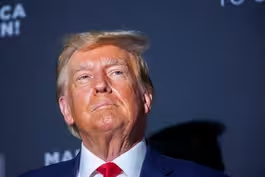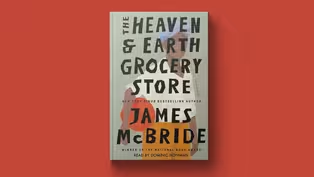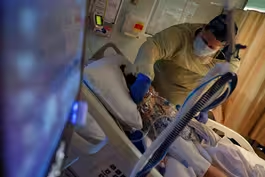
Casualties mount as Ukraine's counteroffensive continues
Clip: 8/8/2023 | 10m 16sVideo has Closed Captions
Casualties mount as Ukraine's counteroffensive continues slow progress
This has been a long and brutal summer in Ukraine as Kyiv's counteroffensive continues to retake lands now occupied by Russia. A leading British military think tank reported that the Ukrainian operation is going more slowly than expected, and it blamed the slow provision of advanced weaponry by Western partners. Amna Nawaz discussed the war with Michael Vickers and Jennifer Cafarella.
Problems playing video? | Closed Captioning Feedback
Problems playing video? | Closed Captioning Feedback
Major corporate funding for the PBS News Hour is provided by BDO, BNSF, Consumer Cellular, American Cruise Lines, and Raymond James. Funding for the PBS NewsHour Weekend is provided by...

Casualties mount as Ukraine's counteroffensive continues
Clip: 8/8/2023 | 10m 16sVideo has Closed Captions
This has been a long and brutal summer in Ukraine as Kyiv's counteroffensive continues to retake lands now occupied by Russia. A leading British military think tank reported that the Ukrainian operation is going more slowly than expected, and it blamed the slow provision of advanced weaponry by Western partners. Amna Nawaz discussed the war with Michael Vickers and Jennifer Cafarella.
Problems playing video? | Closed Captioning Feedback
How to Watch PBS News Hour
PBS News Hour is available to stream on pbs.org and the free PBS App, available on iPhone, Apple TV, Android TV, Android smartphones, Amazon Fire TV, Amazon Fire Tablet, Roku, Samsung Smart TV, and Vizio.
Providing Support for PBS.org
Learn Moreabout PBS online sponsorshipAMNA NAWAZ: This has been a long and brutal summer in Ukraine, as Kyiv's counteroffensive continues to retake its lands in the east and south now occupied by Russia.
A leading British military think tank today reports that the Ukrainian operation is going more slowly than expected and blames the slow provision of advanced weaponry by Western partners.
Meantime, the fighting and dying continue at a horrendous pace.
In the eastern Ukrainian city of Pokrovsk, a desperate search for survivors a day after a deadly Russian attack, residents still reeling from the shelling that killed at least seven people and wounded dozens, even the most innocent.
Ukraine says Russia launched two missiles, 40 minutes apart, to target rescue workers after the initial strike, a tactic called a double tap.
The attack came late in the evening, destroying vehicles and apartment buildings; 58-year-old Kateryna was at home at the time of the blast, the blood from injuries on her face still fresh.
KATERYNA, Pokrovsk Resident (through translator): The flame filled up my eyes.
I fell down on the floor, on the ground.
My eyes hurt a lot.
Otherwise, I am OK, just the shrapnel in my neck.
AMNA NAWAZ: Meanwhile, Ukrainian soldiers continue the fight against Russia in their now-two-month counteroffensive.
They have Western training, U.S.- and European-made weapons, and seemingly infinite resolve, despite soaring temperatures.
YEVHEN, Ukrainian soldier (through translator): We don't pay attention to heat.
Work must be done.
We don't spare ourselves.
AMNA NAWAZ: At the end of July, Ukraine liberated Staromaiorske in a campaign that aims to cut Russia's land bridge from the east to the south and occupied-Crimea.
But progress has been slow along the 900-mile front line, and it comes at great cost.
There's no official figure for Ukrainian casualties, but at field hospitals like this one near Bakhmut, soldiers stream in from the battlefield, their injuries a relentless reminder of the toll of war.
Ukrainians are facing deeply dug-in Russian forces, who've constructed and fortified hard-to-overcome obstacles, including these so-called dragon teeth barricades and hundreds of miles of concentrated land mines, where now even Russian corpses can kill.
VOLODYMYR, Deminer (through translator): When they leave, they plant quite a lot of explosives under their own soldiers.
And this is very dangerous for us.
AMNA NAWAZ: Despite the front-line dangers, last week, President Volodymyr Zelenskyy said Ukraine is succeeding.
VOLODYMYR ZELENSKYY, Ukrainian President (through translator): The occupiers are trying to stop our boys with all their strength.
But whatever the enemy does, it is Ukrainian strength that dominates.
AMNA NAWAZ: For more on the state of the war, we get two views.
Michael Vickers was a senior Defense Department official under Presidents George W. Bush and Obama and served as the CIA's chief strategist during the Reagan administration.
He is the author of "By All Means Available: Memoirs of a Life in Intelligence, Special Operations, and Strategy."
And Jennifer Cafarella is the chief of staff and national security fellow at the Institute for the Study of War.
That's a think tank that tracks military developments.
Welcome to you both.
And, Mike, I want to begin with you and the counteroffensive that we were just reporting on.
You heard President Zelenskyy there say they are succeeding.
What's your assessment?
Is he right?
MICHAEL VICKERS, Former U.S.
Undersecretary of Defense for Intelligence: Yes, I think they hold the strategic initiative, but the counteroffensive is going slower and is proving more difficult than I think many hoped.
And while it's important to note Ukraine hasn't committed its primary force yet, they haven't been able to make much progress against a dug-in enemy, numerically superior enemy, that's had a lot of time to prepare defenses.
AMNA NAWAZ: Jennifer, what's your take on that?
Why have they run into -- the Ukrainian forces, run into the problems they have?
JENNIFER CAFARELLA, Institute for the Study of War: Look, the operation that Ukraine has launched is an incredibly difficult one.
And they faced an enemy that had many months to prepare and layer in defensive positions and fortifications.
And what we're watching is the Ukrainians do what all hard-fought military gains require, which is to learn and adapt on the battlefield.
They are learning and adapting, and they are experiencing some success, although they have not yet achieved that breakthrough that we all hope that they will ultimately achieve.
They are stretching Russian forces.
And, as was already mentioned, the Ukrainians have a reserve that they can still commit to the fight, whereas the Russians do not.
So, there are many reasons to think that, while this is a grind, the Ukrainians can still advance.
AMNA NAWAZ: Well, Mike, the expectations, especially from the Americans, going into this counteroffensive were quite high, right?
There was a lot of optimism, the idea that, with the provision of those advanced military systems with the cluster bombs, that Ukrainians could break through those Russian lines.
Were those expectations unrealistic?
MIKE VICKERS: Well, let me say, we have given Ukraine a lot of military assistance, but I don't think we have given them enough to win.
And they can win.
But while the cluster munitions were a big step forward, we haven't given them, for example, long-range surface-to-surface missiles or the army tactical missile system that can reach out 300 kilometers.
The fighter aircraft is still on the way, as are some armored vehicles.
And the ammunition supply is being built up over time.
So, we wouldn't fight the way we're asking Ukraine to fight.
And we hope they will have success.
But if we really want them to win this thing, we're going to have to provide more assistance.
AMNA NAWAZ: Jennifer, do you agree with that?
JENNIFER CAFARELLA: I absolutely would agree.
And I would only add that we would never fight this way, in part because the casualties are so high and the cost is so high.
But, by God, the Ukrainians are committed to this fight, and they are still advancing.
So this is a question of enabling them to advance faster, to reduce their costs, and, ideally, to overpower the Russians before the Russians are able to patch some of the vulnerabilities that have plagued them thus far.
AMNA NAWAZ: Jennifer, what about those casualties so far, though?
We talk a lot about the losses on the Russian side.
What about casualties on the Ukrainian side and the morale there?
JENNIFER CAFARELLA: Well, the Ukrainians are obviously tight-lipped about the actual numbers of casualties that they're experiencing for very good reasons.
But what we know is that Ukrainian commitment to this fight remains extraordinarily high.
The Ukrainians do not seem in any way deterred by the slow progress that they are experiencing on the battlefield.
I think, in many respects, going into this offensive, they may have had more realistic expectations about the nature of the fighting and the costs that they would take than perhaps some in Washington looking at the situation hoping for a major breakthrough.
AMNA NAWAZ: So, Mike, some of the conversation leading into the counteroffensive was, with enough support, Ukraine can make enough gains that they at least improve their position for a better potential negotiating position down the line.
Do you see that happening?
MICHAEL VICKERS: Well, it may take into next year.
There's a chance the Russian army could collapse this year.
But if we want to increase the odds of that outcome -- and I sure hope we do -- we will have to make the political case for it and provide the assistance that I mentioned earlier.
AMNA NAWAZ: Jennifer, what do you make of that?
JENNIFER CAFARELLA: I would say that it's important that we not impose upon Ukraine a desire for what they might regard as a premature negotiation.
The Ukrainian position is clear.
They expect to retake all of their terrain, and they expect the Russians to pay for damages and for war crimes to be prosecuted.
Those are the Ukrainian war aims in this case.
And while, of course, diplomacy always has a place, and we would hope that it would be possible to negotiate an end to this conflict that sees a withdrawal of Russian forces, so far, Vladimir Putin has shown no willingness to negotiate.
AMNA NAWAZ: Mike, do you see this conflict changing shape significantly, as we move into the end of the fighting season later this year?
MICHAEL VICKERS: Well, eventually, weather will slow down offensive operations.
But the conflict has morphed in a variety of ways since the beginning.
And the Ukrainians have performed in a spectacular fashion throughout, but the decisive phase is yet to come.
And, as I mentioned, the Ukrainians will need more assistance to give them the best odds of doing that.
We're asking them to fight, essentially, World War I style right now, when military affairs has moved way beyond that.
AMNA NAWAZ: But if there is not - - Mike, if I can follow with you, if there's not significant amounts of additional support coming, how do you see this unfolding?
Are we moving into a much longer-term, frozen conflict?
MICHAEL VICKERS: So, some of the next tranche of support or more short range anti-aircraft systems.
And that -- while that will help with mobile air defenses, the Ukrainians will need more than that to achieve fire superiority and break through Russian lines and then cut off that land route to Crimea from the Russian mainland.
And that's really the next phase.
AMNA NAWAZ: Jennifer, look ahead for us, if you will.
These concerns about a longer-term frozen conflict, are they real?
JENNIFER CAFARELLA: Concerns about a protraction of the conflict are real and are further argument for why the West needs to continue to not only provide aid, but ideally to accelerate the provision of aid.
But we also need to keep in mind that this kind of war is not going to be linear.
So, I am sure there will be further surprises.
Those surprises can include a loss of Russian morale or a breakdown in Russian defenses at one place on the front line, which could fundamentally change this conflict.
It's very difficult to predict when or where that could happen, but it is very much still on the table.
And so they're very well could be surprises to come in coming months.
AMNA NAWAZ: We'd love to have you both back to talk about those.
Jennifer Cafarella and Michael Vickers, thank you both for joining us tonight.
Appreciate it.
MICHAEL VICKERS: My pleasure.
JENNIFER CAFARELLA: Thank you.
Breaking down Trump's claims he can't get a fair trial
Video has Closed Captions
Clip: 8/8/2023 | 6m 47s | Breaking down Trump's claims he can't get a fair trial in 2020 election case (6m 47s)
How cities are converting vacant offices into housing
Video has Closed Captions
Clip: 8/8/2023 | 7m 59s | How some U.S. cities are converting vacant office spaces into housing (7m 59s)
Interior Secretary on new monument protecting tribal land
Video has Closed Captions
Clip: 8/8/2023 | 6m 24s | Interior Secretary discusses importance of new national monument protecting tribal land (6m 24s)
James McBride discusses the themes in his new new novel
Video has Closed Captions
Clip: 8/8/2023 | 7m 5s | James McBride discusses the themes in his new novel, 'The Heaven and Earth Grocery Store' (7m 5s)
Report explores doctors spreading COVID misinformation
Video has Closed Captions
Clip: 8/8/2023 | 6m 41s | Investigation reveals lack of consequences for doctors spreading COVID misinformation (6m 41s)
Providing Support for PBS.org
Learn Moreabout PBS online sponsorship
- News and Public Affairs

FRONTLINE is investigative journalism that questions, explains and changes our world.

- News and Public Affairs

Amanpour and Company features conversations with leaders and decision makers.












Support for PBS provided by:
Major corporate funding for the PBS News Hour is provided by BDO, BNSF, Consumer Cellular, American Cruise Lines, and Raymond James. Funding for the PBS NewsHour Weekend is provided by...





